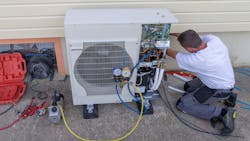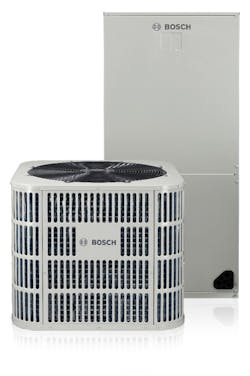ComEd is the largest energy provider in Chicago, and they’ve recently eliminated rebates for traditional central air conditioning. As of July 1, 2023, A/C units are no longer eligible for incentives and new rebates for electrified heat pumps have taken their place—signaling the city’s advocacy for more heat pump installation across the Chicagoland area.
Rebates on heat pumps for residential customers are already up on the ComEd website and incentives for commercial installation are not far behind.
While the impact of this change will be felt most immediately by technicians in the greater Chicago area, the more than four million heat pumps purchased across America in the last year, alone, indicate a larger shift toward electrified HVAC is already in motion. This certainly won’t be the last significant energy provider to push communities and commercial contractors toward heat pumps.
We’ve also seen a natural gas ban in new construction in New York, with similar efforts moving through legislatures in California and other states. All these signs show that the recent movement toward electrified heating and cooling is gaining steam and growing strong.
Heat pumps on the rise
So far, heat pumps have emerged as the most popular and flexible solution for those looking to adopt electrified HVAC technology.
For those new to the conversation, heat pumps are highly energy-efficient systems that operate by transferring heat rather than generating it. This makes them much more efficient than traditional solutions.
Here’s a little Heat Pump 101 for your convenience and reference:
- Heat pumps extract heat from the surrounding environment — from the air, ground or bodies of water;
- They provide heating during colder months AND offer cooling during warmer seasons;
- Dual functionality eliminates the need for separate heating and cooling systems, streamlining installation and maintenance processes for contractors;
- Heat pumps excel at maintaining consistent indoor temperatures, avoiding temperature fluctuations experienced with conventional heating methods.
As heat pumps can be powered by renewable energy sources like solar and wind, more widespread usage of these units would reduce reliance on fossil fuel-based heating, contributing to a significant reduction in greenhouse gas emissions — potentially cutting CO2 emissions by half a gigaton by the end of the decade.
Residential heat pump installations will certainly make an impact, but more widespread commercial installation of heat pumps in apartments, hotels, retail establishments, offices, schools and more, have the potential to solidify the electrified and efficient future of HVAC.
Incentives lay the groundwork
With the 2022 Inflation Reduction Act, the federal government is already offering incentives for specific types of electric-based technology, including heat pumps. The IRA allows states to offer up to $14,000 in rebates for electrified-products (based on income), and consumers can get federal tax credits of up to $2,000 for heat pumps.
Other federal incentives for commercial applications include the U.S. Dept. of Agriculture’s Rural Energy for America Program (REAP), which incentivizes private and public rural entities to adopt renewable energy-powered systems – such as heat pumps – and invest in other energy-efficient upgrades.
But ComEd’s rebates are an important bellwether when it comes to driving adoption of heat pumps on the local level.
ComEd is now offering residential customers incentives that vary in value based on the type of heat pump installed. For instance, customers can get up to $9,000 per home on a new geothermal (ground source) heat pump. Air source heat pump installations—the most common—are eligible for a rebate of up to $2,000, while mini-split heat pumps, which require no ductwork, qualify for up to $1,350 in rebates.
The commercial industry, while not fully eliminating incentives for gas units, is also trending toward greater incentives for alternative solutions, including heat pumps.
ComEd offers tailored incentives for new construction projects that implement energy-efficient improvements in multi-family, parking garage, office, retail, warehouse and industrial developments. In new office construction, for instance, projects that install electric heating equipment – such as heat pumps – with rated efficiency meeting CEE Tier 1 requirements can earn contractors $0.02 per gross square foot.
This local focus on driving heat pump adoption certainly has implications for commercial contractors.
Expansions in available incentives and subsequent wider spread adoption of electrified HVAC products will allow property developers to boast their developments’ green credentials and emerge as a leader in clean heating and cooling.
Heat pumps also promise lasting value, streamlining home comfort operations by combining heating and cooling capabilities into one system that requires less maintenance over time than traditional units. Couple this with the fact that heat pumps decrease utility costs, and developers and property owners, alike, can provide prospective tenants with more cost- and energy-efficient home comfort.
Prepare for installation and compliance
It is crucial for commercial HVAC professionals to be aware of changing local and regional regulations (and incentives, of course) when it comes to smart heating and cooling technology, as they may vary in scope and implementation.
To install the right equipment the right way, ensure compliance and maximize incentives, HVAC pros can follow these guidelines:
- Learn local and regional regulations regarding heat pump installation, and research the specific requirements for compliance;
- Invest in training and certification programs to equip yourself or your team with the necessary expertise to install, maintain and service heat pump systems effectively;
- Collaborate with suppliers who specialize in heat pump technology now and hit the ground running. Establish partnerships to ensure a reliable supply chain for high-quality equipment, parts and components necessary for installation and maintenance;
- Educate customers about the benefits of heat pumps as a replacement for natural gas heating systems;
- Optimize the design and layout of new construction to accommodate heat pumps. Ensure adequate space allocation and ventilation for the installation of the indoor and outdoor components of the system;
- Engage with experts in renewable energy consultants and energy efficiency to gain insights into the latest technologies and incentives;
- Maintain accurate documentation of the heating systems installed in each project, including specifications and certifications. This documentation will be vital when applying for incentives and ensuring compliance with regulations.
##########
Based in Massachusetts, the author is a product manager at Bosch Home Comfort, North America. Focused on bringing geothermal water source heat pumps to market, McIver is an experienced engineer with a demonstrated history of working in the consumer goods industry.
About the Author
Ian McIver
Product Manager - Bosch Home Comfort
Based in Massachusetts, the author is a product manager at Bosch Home Comfort, North America. Focused on bringing geothermal water source heat pumps to market, McIver is an experienced engineer with a demonstrated history of working in the consumer goods industry.

